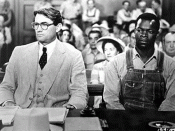To Kill a Mockingbird is a book that teaches all people the wonders of human nature. Atticus for example shows many characters throughout the novel, but his greatest aspect is his ability to parent. Although Atticus's relatives disagree with his method of raising Scout and Jem, he believes that there is no better teacher than life itself. Even if he allows these things to occur, Atticus still is able to influence the children by his actions. Throughout the novel, Atticus shows courage, respect for everyone and everything, and as well as sympathy and understanding. From his actions as well as life itself, Atticus remains the father figure in the novel.
The first lesson that is taught to the children is the meaning of respect. At the beginning of the novel, the children are influenced by their surroundings and as a result, believe that Boo Radley is somewhat of a monster or a ghost.
Dill being curious, involves Scout and Jem in a game to act out Boo's life. Seeing no harm in a little game, Atticus ignores them and hopes they would become bored it, but once they decided to go a little further to approach Boo's house, Atticus stops them immediately. Atticus brings them in and lectures them of being respectful even to Boo. Later on in the story, Jem loses his temper defending Atticus from Mrs. Dubose's taunts. This leads to Jem chopping off the heads of Mrs. Dubose's camellias. Once Jem reaches home, he sees Atticus in the room holding the heads of the camellia plants. At this point, Atticus is not furious and does not want to harm Jem, but just to apologize and try to do Mrs. Dubose's biddings until he is forgiven. "'Read to her?' 'Yes sir. She wants me to come every afternoon after school on Saturdays and read to her out loud for two hours. Atticus, do I have to?' 'Certainly.' ' But she wants me to do it for a month.' 'Then you'll do it for a month'"(Lee, 110). Here we see that even though Atticus treats this lightly, he is firm with his decisions. He believes that even if Mrs. Dubose does make rude comments about Atticus, she has a right to and should still be respected as a human being. Now, Atticus does not only respect human beings, but he also respects all living creatures. He too believes they should be treated with fairness. "Mocking birds don't do one thing but to make music for us to enjoy. They do not eat up people's gardens, don't nest in corncribs, they don't do one thing but sing their hearts out for us. That's why it's a sin to kill a mockingbird" (Lee, 94). One sees here that Atticus is a kind and fair man. Later in the book, we see Jem to pick up this certain trait when he stops Scout from squashing a poor bug.
During the hardest times in the book, Atticus is still able to show sympathy and understanding. In the trial, Atticus examines Mayella Ewell on the supposed rape by Tom Robinson. After the trial, even when Atticus as well as the rest of the crowd knows Tom is innocent, Atticus did not lash out and point fingers. At the same time, he did not feel hate towards Mayella as one learns from this quote: "So if spitting in my face and threatening me saved Mayella Ewell one extra beating, that's something I'll gladly take" (Lee, 221). This shows that even when Atticus was defeated and taunted, he still felt sympathy towards Mayella. One can say that Atticus also understood her from her perspective. Being the daughter of a drunkard, abusive father, Mayella certainly should feel threatened by Mr. Ewell. Atticus saw this point of view and did not want to embarrass her in front of everyone and anger Bob even more. He was afraid Bob might lash out on Mayella to release his own anger. We can see another example of his understanding trait when he teaches uncle Jack how to understand children. Uncle Jack, before the lecture from Atticus, had seen Scout fighting with her cousin Cecil Jacobs. Although Cecil had started the brawl, uncle Jack does not care for Scouts side of the story. "'⦠-- she had asked me what a whore-lady wasâ¦' 'Did you tell her?' 'No, I told her about Lord Melbourne.' 'Jack! When a child asks you something, answer him, for goodness' sake'" (Lee, 92). One can see that Atticus once again shows understanding towards the children. Although Atticus knows Scout is listening to their entire conversation, Scout had figured out that Atticus wanted her to listen to every word of it and try to figure out why he did. This was because Atticus wanted her to understand the nature of some people and should not mistrust anyone the next time.
Probably the most emphasized theme and trait in the novel is courage. Different forms of courage are found at different stages of the book. There is the courage to stand up for one's rights, to face one's own fears, to have the courage to not overreact when provoked, and finally the courage to try even if it is for a lost cause. A good example of the courage to stand upon one's rights was when Atticus defended the Negro because he had believed the Negro was innocent. He had spent all his effort defending Tom without ever doubting his reasons to, but he knew even before the trial that Tom was going to be persecuted. "I wanted you to see what real courage is, instead of getting the idea that courage is a man with a gun in his hand. It's when you know you're licked before you begin but you begin anyway and you see it through no matter what" (Lee, 116). In saying this, Atticus teaches Jem his point of view on what true courage is. Facing one's fears without any hesitation is another form of courage Atticus had shown through his actions. One learned Atticus is a peaceful, loving man who cares for all creatures. He had to put this all to a side once he was faced with the rabid dog. The sheriff had wanted Atticus to shoot the dog because it had to be done in one shot. Back in his days, Atticus was the sharpshooter of Maycomb and could shoot almost everything in one shot. After killing the rabid dog, Atticus had taught the children two lessons of courage. Atticus being the animal loving man had to set apart his dislike of killing them in order to do this required job. This act also taught the children to be humble and to have the courage not to brag about a God-given advantage over other people. The next courage test came when Atticus was at the post office and had seen Bob there. "Atticus didn't bat an eye, just took out his hankerchief and wiped his face and stood there and let Mr. Ewell call him names wild horses could not bring her to repeat" (Lee, 220). This act of courage teaches Jem and Scout not to lose their temper over something that can be resolved by just ignoring.





